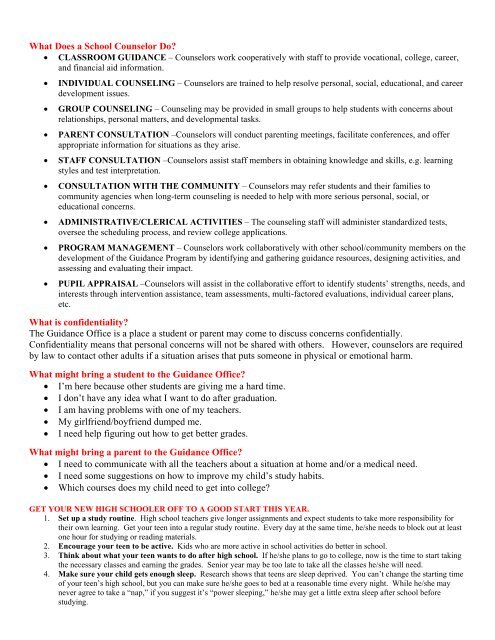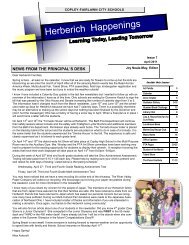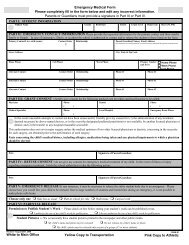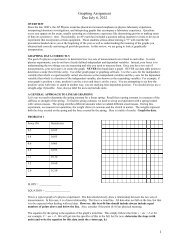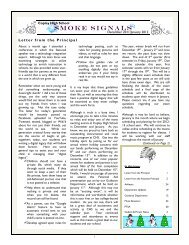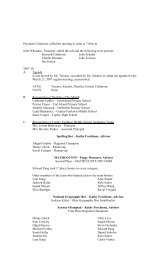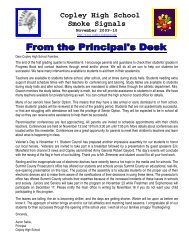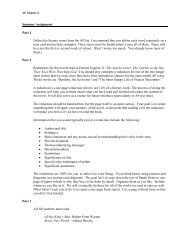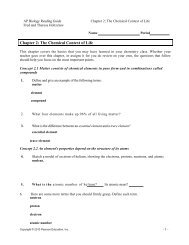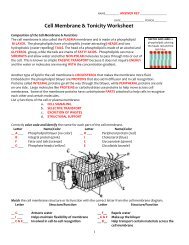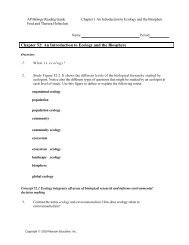Copley High School Smoke Signals - Copley-Fairlawn City Schools
Copley High School Smoke Signals - Copley-Fairlawn City Schools
Copley High School Smoke Signals - Copley-Fairlawn City Schools
Create successful ePaper yourself
Turn your PDF publications into a flip-book with our unique Google optimized e-Paper software.
What Does a <strong>School</strong> Counselor Do?<br />
• CLASSROOM GUIDANCE – Counselors work cooperatively with staff to provide vocational, college, career,<br />
and financial aid information.<br />
• INDIVIDUAL COUNSELING – Counselors are trained to help resolve personal, social, educational, and career<br />
development issues.<br />
• GROUP COUNSELING – Counseling may be provided in small groups to help students with concerns about<br />
relationships, personal matters, and developmental tasks.<br />
• PARENT CONSULTATION –Counselors will conduct parenting meetings, facilitate conferences, and offer<br />
appropriate information for situations as they arise.<br />
• STAFF CONSULTATION –Counselors assist staff members in obtaining knowledge and skills, e.g. learning<br />
styles and test interpretation.<br />
• CONSULTATION WITH THE COMMUNITY – Counselors may refer students and their families to<br />
community agencies when long-term counseling is needed to help with more serious personal, social, or<br />
educational concerns.<br />
• ADMINISTRATIVE/CLERICAL ACTIVITIES – The counseling staff will administer standardized tests,<br />
oversee the scheduling process, and review college applications.<br />
• PROGRAM MANAGEMENT – Counselors work collaboratively with other school/community members on the<br />
development of the Guidance Program by identifying and gathering guidance resources, designing activities, and<br />
assessing and evaluating their impact.<br />
• PUPIL APPRAISAL –Counselors will assist in the collaborative effort to identify students’ strengths, needs, and<br />
interests through intervention assistance, team assessments, multi-factored evaluations, individual career plans,<br />
etc.<br />
What is confidentiality?<br />
The Guidance Office is a place a student or parent may come to discuss concerns confidentially.<br />
Confidentiality means that personal concerns will not be shared with others. However, counselors are required<br />
by law to contact other adults if a situation arises that puts someone in physical or emotional harm.<br />
What might bring a student to the Guidance Office?<br />
• I’m here because other students are giving me a hard time.<br />
• I don’t have any idea what I want to do after graduation.<br />
• I am having problems with one of my teachers.<br />
• My girlfriend/boyfriend dumped me.<br />
• I need help figuring out how to get better grades.<br />
What might bring a parent to the Guidance Office?<br />
• I need to communicate with all the teachers about a situation at home and/or a medical need.<br />
• I need some suggestions on how to improve my child’s study habits.<br />
• Which courses does my child need to get into college?<br />
GET YOUR NEW HIGH SCHOOLER OFF TO A GOOD START THIS YEAR.<br />
1. Set up a study routine. <strong>High</strong> school teachers give longer assignments and expect students to take more responsibility for<br />
their own learning. Get your teen into a regular study routine. Every day at the same time, he/she needs to block out at least<br />
one hour for studying or reading materials.<br />
2. Encourage your teen to be active. Kids who are more active in school activities do better in school.<br />
3. Think about what your teen wants to do after high school. If he/she plans to go to college, now is the time to start taking<br />
the necessary classes and earning the grades. Senior year may be too late to take all the classes he/she will need.<br />
4. Make sure your child gets enough sleep. Research shows that teens are sleep deprived. You can’t change the starting time<br />
of your teen’s high school, but you can make sure he/she goes to bed at a reasonable time every night. While he/she may<br />
never agree to take a “nap,” if you suggest it’s “power sleeping,” he/she may get a little extra sleep after school before<br />
studying.


